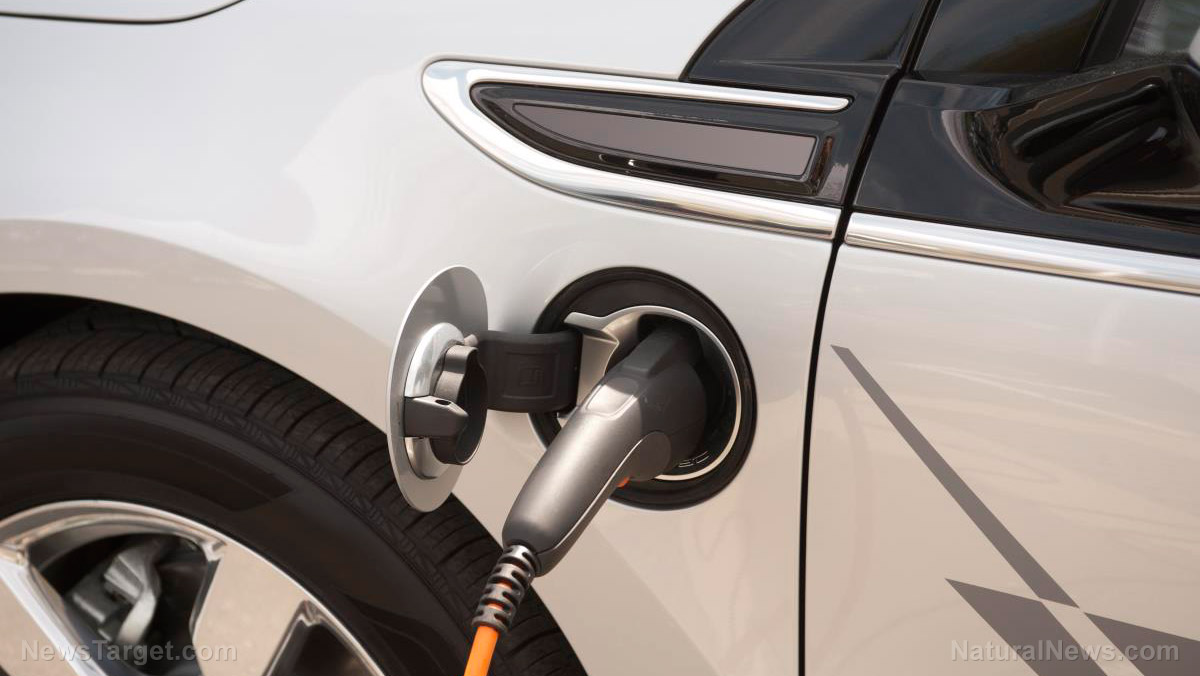 Parler
Parler Gab
Gab
EVs touted as the green transport solution despite their risks
Abby Liebing, an associate reporter for the Western Journal, wrote about the three home fires caused by the EVs being charged. "These are not terribly remarkable events. The damages are unfortunate, but not catastrophic," she noted. "As EVs become more common, the risk of fires associated with [them] cannot be overlooked or underplayed." A CNBC report that quoted a study by vehicle insurer AutoinsuranceEZ said hybrid EVs have a 3.4 percent chance of igniting. Conventional battery EVs only have a 0.03 chance of igniting, while internal combustion engines powered by fuel have a 1.5 percent chance of catching fire. The same report added that EVs using lithium-ion batteries burn hotter and faster when they catch fire. Such fires require more water to extinguish, with Liebing citing an example of one such conflagration. A fire from a Tesla EV that crashed in Houston back in April 2022 took firefighters more than four hours and 30,000 gallons of water before they finally extinguished it. Moreover, fires caused by lithium-ion batteries can reignite hours or even days after they were initially extinguished – putting salvage yards, car repair shops and other similar establishments at risk. Eric Wachsman, the director of the Maryland Energy Innovation Institute, told CNBC that the qualities that make lithium-ion batteries powerful enough to move vehicles can also make them susceptible to catching fire – most especially if the battery cells inside them are damaged or defective. According to Wachsman, the flammable liquid electrolyte, coupled with electrodes positioned closely together, increases the chance of a short circuit. "This flammable liquid could get into what's called a thermal runaway situation where it just starts boiling, and that results in a fire," he explained. Liebing concluded: "Though many like to advertise EVs as flawless, the way of the future and the green energy solution, [they] still have problems just like any other vehicle. But somehow, since the political messaging around EVs has been all about how they are good for the environment and how they are the way for humans to move forward – there has been a real downplaying of the risks still involved. These facts of EVs have to be recognized [as] all vehicles have risks and can be deadly." Power.news has more stories about the risk of EVs and the lithium-ion batteries that power them. Watch InfoWars founder Alex Jones investigating an EV charging station in Austin, Texas. This video is from the Winston Churchill ♡ Vitamin D channel on Brighteon.com.More related stories:
Op-ed: Increased lithium demand for electric vehicle batteries comes with a price. Contrary to what people believe, electric vehicles are not cheaper than gas-fueled vehicles. Bombshell science study shows that electric cars are DIRTIER for the planet than diesel vehicles. The Democrat's plan to force Americans to drive electric vehicles just got even more EXPENSIVE. Sources include: WesternJournal.com WTOP.com 1 WTOP.com 2 WTOP.com 3 CNBC.com Brighteon.comDiminished US refining capacity from facility closures contributing to soaring gas prices
By Belle Carter // Share
As fuel prices poised to TRIPLE, EU mulls rationing gas across bloc
By Ethan Huff // Share
Giant swarms of locusts ravage over 80% of crops and livestock feed in region of Russia
By Belle Carter // Share
Glen Canyon Dam close to shutting down as Lake Powell water levels continue to drop
By Arsenio Toledo // Share
Governments continue to obscure COVID-19 vaccine data amid rising concerns over excess deaths
By patricklewis // Share
Tech giant Microsoft backs EXTINCTION with its support of carbon capture programs
By ramontomeydw // Share
Germany to resume arms exports to Israel despite repeated ceasefire violations
By isabelle // Share










